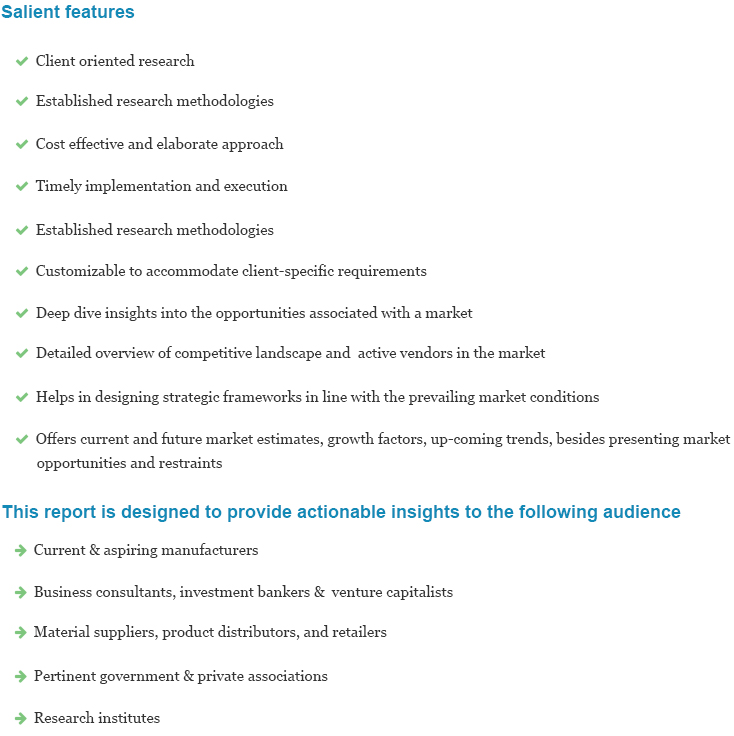
Air Compressor Market Size By Technology (Screw/Rotary, Reciprocating, Centrifugal), By Product (Portable, Stationary), By Lubrication (Oil Free, Oil Filled), By Application (Home Appliances, Food & Beverage, Oil & Gas, Energy, Semiconductors & Electronics, Manufacturing, Healthcare), Industry Analysis Report, Regional Outlook, Application Potential, Price Trends, Competitive Market Share & Forecast, 2016 - 2024
- Published: June, 2016
- Format: Electronic (PDF)
- Number of pages: 98
- Industry: HVAC & Construction
The global air compressor market is expected to grow at a CAGR of above 4.5% over the forecast period of 2016 to 2024. Air compressor is a device that converts electrical power into potential energy stored in pressurized air (compressed air) form. It is a universal product having multiple applications across numerous industries segmented according to technology, application, lubrication and regional outlook.
Advent of energy efficient air compressors available in portable model, are widely being adopted across numerous industrial activities. Rising demand from non-oil and gas-based industries such as infrastructure, petrochemicals, metal & mining and power is expected to drive the market. Carbon dioxide emissions from products and industrial products are foreseen to increase gradually owing to government rules and regulations.
Growing demand for replacement of aged equipment with part replacements or complete substitution with new improved technology is anticipated to be substantial driver for growth.
Market size for air compressor is huge owing to wide applications in industries such as Automotive, Electronics, Food & beverage, Aerospace, Hospitals/Medical, Petroleum, Plastics, Power generation and chemical manufacturing. In chemical industry, compressors are used for conveying, controlling and enabling actuators. Process gas compressing, controls and actuators are rare functions in petroleum industry.
Drivers fuelling growth for air compressor market include low maintenance, efficient compressor operation, rising adoption of variable speed controllers, after-market service and retrofitting of existing system. Increase in adoption in energy & mining, oil & gas and petrochemical industry is expected to drive the market where compressor controllers are utilized in production. Extraction of natural gas from shale gas reserves is further expected to boost demand and create potential for the market.
Delivering pure air to Hospitals and other medical facilities are covered under plethora of regulations hampering the growth factor for new entrants. Reluctance to adopt new technologies owing to high prices is also likely to hinder growth of the market.
A major area of concern such as air contamination is limiting the adoption of air compressors due to oil lubrication and noisy operations of oil-free compressors. Efforts from major vendors to increase efficiency would limit air contamination and noise generation.
The market is segmented on the basis of technology, product, lubrication and region.
On the basis of technology, market is segmented into centrifugal, reciprocating and rotary air compressors. Centrifugal compressors produce high-pressure air by slowing air-flow through a diffuser. Centrifugal compressors are widely utilized for higher capacity as the flow is continuous. Prospects for centrifugal compressor have broadened owing to escalating demand for energy.
Reciprocating compressors increase pressure of the air by lowering its volume & comprises of piston within a cylinder as the compressing and displacing element.
Rotary air compressors are rotor induced compressed air which contains no valve and the units are oil cooled using oil seals. Advantages of rotary compressor include pulse-free air output in a compact size with high output volume and smooth operation. Demand from HVAC industry is playing a vital role in the growth of rotary air compressor market as they are key component of heat pump and air conditioning system. However, High operational cost is expected to hamper sales volume over the forecast period.
On the basis of product, market is segmented into stationary and portable compressors. Low duty applications, low maintenance and convenience in handling have boosted demand for portable air compressor. However, stationary air compressor still has a high market share compared to portable compressors.
On the basis of lubrication, oil-free compressors are witnessing increased adoption across industries such as pharmaceuticals, food & beverages and electronic assembling. Oil-lube model should be utilized for the application of air tools. Maintenance is a major hurdle for dampened growth of oil-lube compressors.
On the basis of region, Asia pacific is expected to grow at over 4.5% driven by growth prospects in countries such as India where foreign direct investment (FDI) and relaxation in clearance for company establishment is expected to boost the market. Demand in North America and Europe is expected to be steady owing to volatile market conditions.
Vendors are working on variable speed technology for controlling compressor operation based on user requirement. Continuous and real-time nature of compressors which would provide superlative energy efficiency and substantial decrease in emission levels is expected to drive the market further over forecasted period.
Global vendors manufacture depending upon application in a particular industry. Atlas capco, Denso, Ingersoll-rand, Sullair are major global vendors followed by Siemens, MAN diesel, Rogers Machinery Company, GE, Mattei and Westair.
Atlas capco expanded its range of oil-free compressors to cater numerous industrial applications whereas wabco holding inc. has entered strategic alliance with Cummins inc. to manufacture and meet global demand.

Choose License Type
- World's largest premium report database
- Transparent pre & post sale customer engagement model
- Unparalleled flexibility in terms of rendering services
- Safe & secure web experience
- 24*5 Research support service
